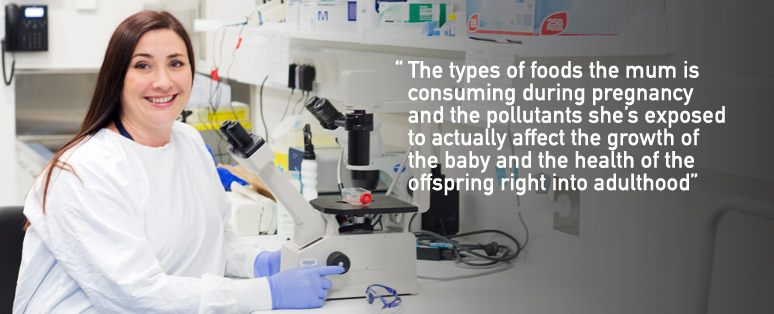Researcher Highlights
An inch wide and a mile deep
Dr Kirsty Pringle
Dr Kirsty Pringle is acquiring and sharing critical knowledge about pregnancy and women’s reproductive health.

Putting a creative spin on the old saying ‘You are what you eat,’ Dr Kirsty Pringle is telling soon-to-be mothers ‘You and your baby are what you eat, drink, and come into contact with.’ It’s not as catchy, but with her growing portfolio of evidence-based research on women’s reproductive health, it’ll stick.
“It is quite well known now that the intrauterine environment that the fetus grows in can program that fetus for lifelong health and disease,” Kirsty asserts.
“So the types of foods the mum is consuming during pregnancy and the pollutants she’s exposed to actually affect the growth of the baby and the health of the offspring right into adulthood.”
“At the Mothers and Babies Research Centre, we are interested in getting this first part right so that we can improve the health of the next generation of Australians.”
Beginning her research career in 2003 with a PhD in obstetrics and gynaecology at the University of Adelaide, Kirsty has gone from strength to strength, studying the development of the placenta in mice to improve embryo culture and IVF success rates and then graduating to human studies.
Nipping it in the bud
Currently, Kirsty is collaborating with Dr Kym Rae, Laureate Professor Roger Smith and Emeritus Professor Eugenie Lumbers on observational research of Indigenous maternal, neonatal and infant health. A continuation of her early laboratory work on the development of placentas, the ambitious regional NSW project is seeking to cement a scientific, nuanced understanding of the “multifactorial” pregnancy complications experienced by this at-risk population.
“While other researchers are examining the impact of things like nutrition, anxiety and depression, I am specifically focusing on the programming of kidney disease and cardiovascular disease,” she elaborates.
“There are high rates of both of these illnesses in the Aboriginal community.”
Tracking the progress of more than 200 Indigenous mothers and their newborns recruited from Tamworth, Walgett and Newcastle for five years, the team is searching for ways to narrow, if not close the gap, on Indigenous disadvantage in reproductive health.
“Our goal is to identify what can be changed or improved during pregnancy to support the proper development of the babies’ kidneys so they’re less likely to contract kidney disease when they’re older,” Kirsty explains.
“We’re also hoping to figure out how we can treat preeclampsia earlier and, if possible, more successfully.”
“Those in the cohort who experience it during pregnancy are more likely to develop cardiovascular disease later in life.”
“This research isn’t just about offspring – we want to help the mums too.”
As hardworking as she is forward thinking, Kirsty is planning to translate the team’s findings into something practicable, measurable and valuable.
“Underlying kidney dysfunction is not picked up clinically,” she concedes.
“So I would like to put in place some sort of procedure that allows us to routinely follow up these women and ensure the problem doesn’t grow too big or overwhelming.”
“Really, it should be worked on before it even becomes a problem.”
A drug by any other name
A master at multitasking, Kirsty is simultaneously devoting her attention to endometrial cancer.
“In collaboration with Emeritus Professor Eugenie Lumbers and other Newcastle researchers, we are looking at the medications that are typically used to treat high blood pressure (hypertension) in the general population and seeing if any of them are able to be repositioned to treat endometrial cancer,” she shares.
“Because these drugs are used clinically, they’re already recognised as safe and effective.”
“There is good evidence in the literature to suggest that those taking one class of anti-hypertensive drugs, that is, those drugs that block the renin-angiotensin system, have a reduced risk of certain cancers, in particular, female specific cancers.”
Obtaining different endometrial cancer cell lines from biopsies and other donated patient samples over the past couple of years, Kirsty is working to prove that these medications are also effective in inhibiting the growth of tumours.
“Preliminary data says they are,” she discloses.
Again linking this back to her core laboratory research, Kirsty acknowledges that the renin-angiotensin system, which is involved in the control of blood pressure and in tissue growth and blood vessel development, is also important for placental development.
“In the instance of cancer, we think that the system is overactive while in the placenta, in particular in pregnancies complicated by placental insufficiency, it may be underactive,” she describes.
“The placenta is a brand new, fully functional organ that develops within just a few months to support the baby.”
“This rapid development is essential to nourish the growing baby.”
“In some pregnancies, however, we think that the system is not very active, so you get poor placental growth and that’s why you might get preeclampsia, for example.”
“We want to figure out ways to boost the system so that there is more exchange of nutrients between the mother and the fetus.”
A different kind of gender debate
Kirsty is continuing to build on her postdoctoral research at UON as well, coming across a handful of “fascinating” findings and raising a bigger handful of questions that deserve further probing.
“We’ve long known that male babies are more likely to be born preterm and are at an increased risk of neonatal mortality,” she states.
“I am testing the novel idea that this is related, at least partially, to the fact that the renin angiotensin system is more active in the intrauterine tissues of women who have female babies.”
“I want to understand why this is and why we have this sex difference.”
Related links
The University of Newcastle acknowledges the traditional custodians of the lands within our footprint areas: Awabakal, Darkinjung, Biripai, Worimi, Wonnarua, and Eora Nations. We also pay respect to the wisdom of our Elders past and present.
